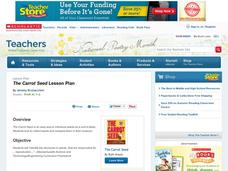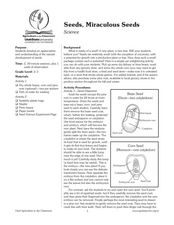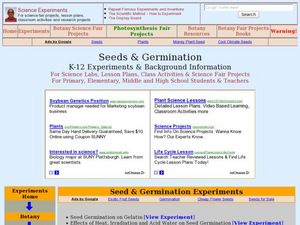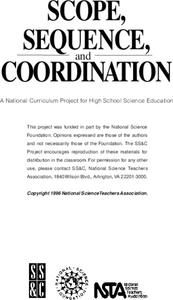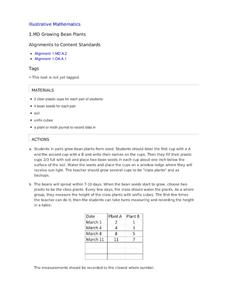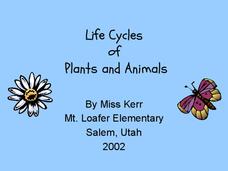Curated OER
Green Plants
Beginning botanists are introduced to the world of plants with this PowerPoint. Some of the information is most appropriate for primary learners, such as the needs of a plant. Some of the information, however, is more directed at...
Curated OER
Carrot Seed Lesson Plan
Learners create a seed museum. In this early childhood lesson plan, students identify various seeds and the plants the seeds will grow into. Learners write a description of the plant, illustrate the plant and create a seed museum in...
Curated OER
Seed Dispersal By Animals
In this seed dispersal by animals instructional activity, students read for information and complete comprehension activities. In this short answer instructional activity, students answer nine questions.
Curated OER
Seeds, Miraculous Seed
Students investigate relationships between plants and animals and how living things change during their lives. In this life cycle lesson, students split different types of seeds apart to see the beginning life stages of future plants.
Curated OER
Plants Need Soil
Third graders identify what plants need to grow. In this agricultural lesson, 3rd graders read the book The Empty Pot and discuss the steps to take when planting a seed. Students plant a seed and water it each day. Students discuss their...
Curated OER
PLANT LIFE CYCLES
Student learns about the life cycle of plants by watching a time-lapse video. This activity provides students with further evidence that all living things grow and change as they progress through their life cycle. Student conducts a...
Curated OER
Seeds & Germination
Students study the types and parts of seeds and how they have evolved. In this germination lesson students complete experiments that show the effects of variables role in seed germination.
Casimir Middle School
Biological Classification Worksheet
Classify living things with a set of worksheets that has pupils sorting and indentifying living and non-living things. Learners use the worksheets as a basis for finding their answers.
Biology Junction
Seed Plants: Gymnosperms and Angiosperms
One of the reasons plants found success on land relates to seed development. Scholars learn about many different forms of seeds and how they changed over time. It describes the structure and function of many different types of seeds in...
Curated OER
All About Seeds!
First graders learn all about seeds. For this biology lesson, 1st graders discover: what a fruit is, what is inside of seeds, and how seeds are transported.
Curated OER
Seed Dispersal
Students explore seed dispersal by designing their own wind dispersed seed structure. Using one piece of paper and a box fan, they construct a seed dispersal structure, record the distance their seed travels, and answer discussion...
Curated OER
Parts of the Plants that we Eat
First graders study plants and their parts to see what parts are edible. In this plant lesson students are assigned plant parts and they are to put them in the right category.
Curated OER
Edible and Medicinal Plants: Field Trip Guide
Though it's designed to guide a field trip to the New York Botanical Garden, you could take resource like this one to a local park, wilderness area, school garden, or even a weedy empty lot. Middle schoolers identify plant parts and...
Curated OER
How are Seeds the Same and Different?
Students examine seeds from various plants. In this science activity, students cut open fruits and vegetables in order to see the seeds. Students describe each type of seed and classify the seeds.
Curated OER
Plant Parts and their Function
Discover why plants are important to our world. View plant parts and categorize them as stems or buds. Students do a cut and paste of pictures of plants into correct categories. Students also plant a carrot top,and record the growth and...
Curated OER
The Seeds We Need
Learners apply word analysis skills to recognize new words, identify genres of fiction and nonfiction, and identify important themes and topics. They explore differences in plants, flowers, and vegetables. A book bag full of activities...
Curated OER
Plant Diversity
Here is an all-encompassing overview of the plant kingdom! In this worksheet, beginning botanists describe characteristics of the four different plant phyla, explain various life cycles, differentiate between monocots and dicots, and...
Curated OER
Classification Schemes
Junior biologists journey through the hiearchy of living things with these activites. Using a dichotomous key, they identify common algae, plants, and fish. They design their own key for a mixture of seeds and a collection of...
Curated OER
Plants have needs, too!
Plants can die if they don't get enough sunlight and water. Kindergartners observe a picture of a hanging plant and grass under a tree, and interpret which each plant has died. Next, they grow watercress seeds in wet cotton to compare...
Curated OER
Sexual Plant Propagation
Grow plants from seeds! Explore the methods of propagating plants and the best ways to germinate seeds for all types of plants. Details about the treatment of seedlings and ways to increase efficiency in your production of numbers are...
Illustrative Mathematics
Growing Bean Plants
Plant growth experiments offer rich, cross-curricular learning opportunities that can really excite and engage young learners. In this series, children work in pairs planting, measuring, and comparing the height of bean plants in order...
Agriculture in the Classroom
Seed Match
Using this resource, your team of green thumbs discuss why plants are a part of a healthy diet and the different ways they are used in daily life. They then observe the characteristics of different seed as they attempt to match them with...
Curated OER
Life Cycles of Plants and Animals
What a cute way to introduce life cycles through a PowerPoint! The pictures and basic stages of the lives of butterflies, frogs, and plants are shown with cartoon pictures. there is also a prompt for your pupils to consider other life...
Perkins School for the Blind
Creating a 3-D Model of a Plant Life
Instructing blind or visually impaired learners means you need to make symbolic tactile representations of various processes to provide as much input as possible. But wouldn't it be even better to have your learners make the models...



